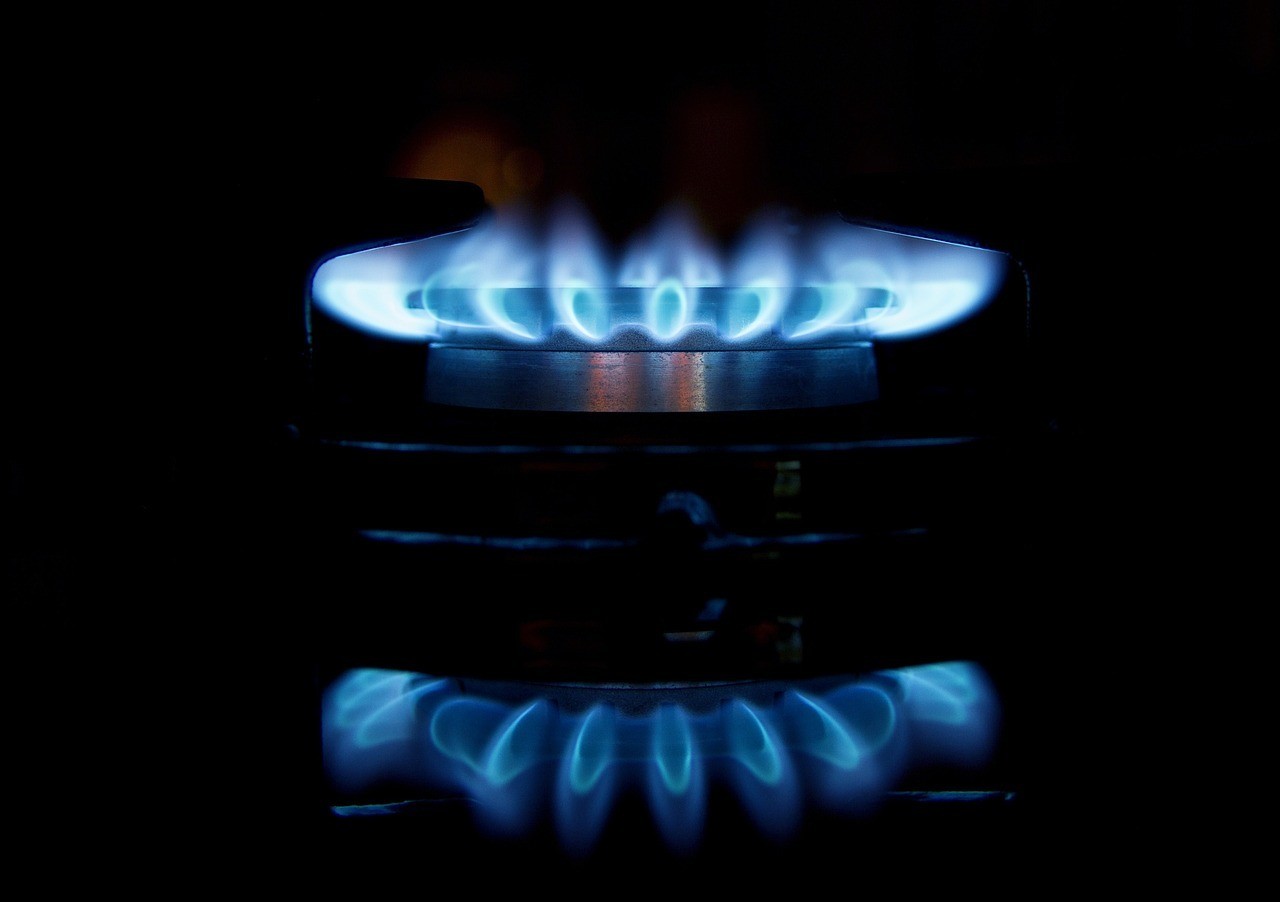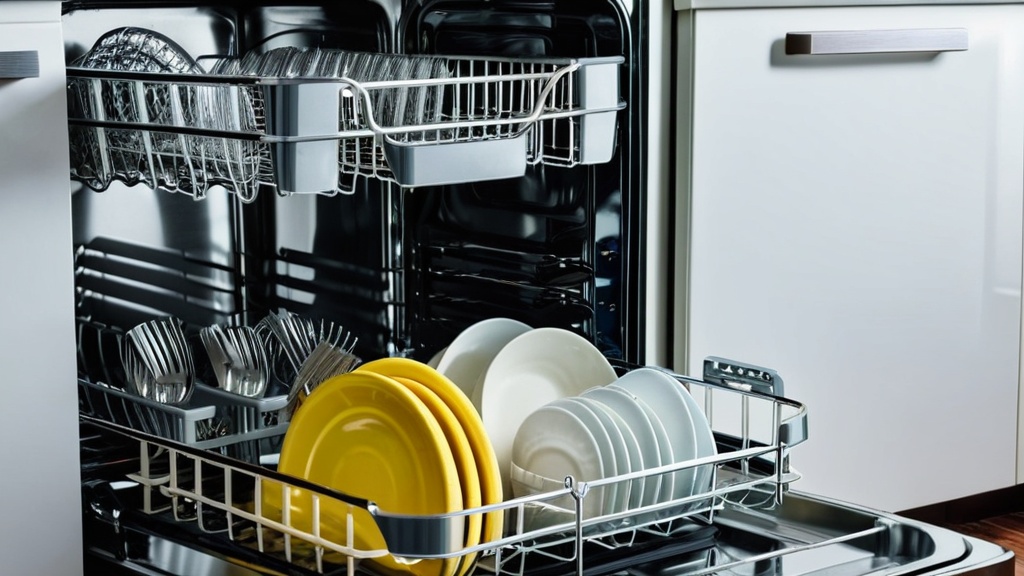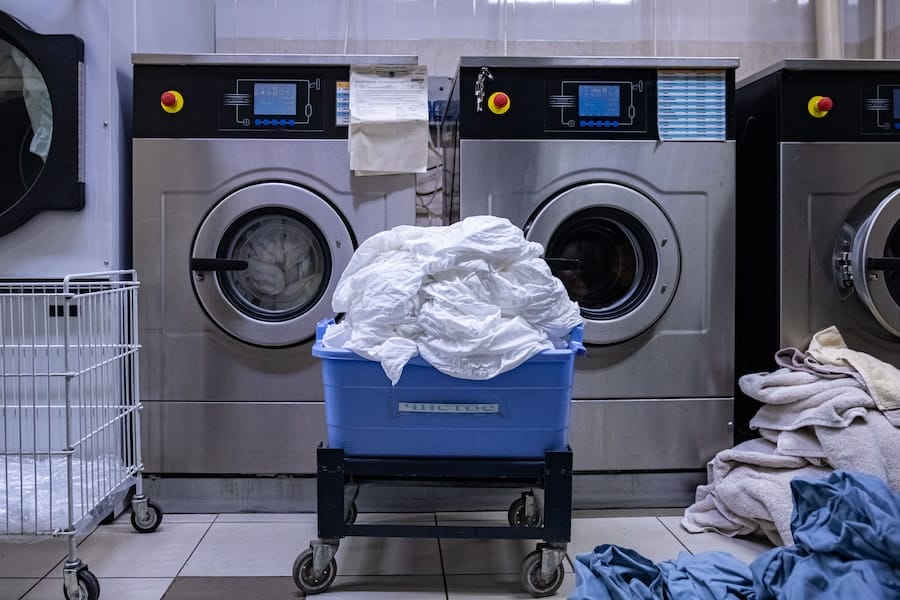Cleaning can be a time-consuming and tedious task, but with the right appliances, it can become much more efficient. Appliances such as dishwashers, washing machines, refrigerators, vacuums, steam cleaners, ovens, and microwaves can all help streamline the cleaning process and save you valuable time and effort. These appliances are designed to tackle specific cleaning tasks and can make your life much easier.
One of the main benefits of using appliances for cleaning is the time-saving aspect. With a dishwasher, for example, you can simply load your dirty dishes and let the machine do the work for you. This frees up your time to focus on other tasks or simply relax. Similarly, a washing machine allows you to quickly and easily clean your clothes without having to spend hours hand-washing them. Appliances also often provide a more thorough and efficient clean than manual methods, ensuring that your dishes, clothes, and surfaces are spotless.
Table of Contents
- Key Takeaways
- Tips for Efficient Cleaning with Dishwashers
- How to Use Your Washing Machine for Efficient Cleaning
- Efficient Cleaning Tips for Your Refrigerator
- Vacuuming and Efficient Cleaning: Tips and Tricks
- Efficient Cleaning with Steam Cleaners
- How to Clean Your Oven for Maximum Efficiency
- Using Your Microwave for Efficient Cleaning
- Final Thoughts on Efficient Cleaning with Appliances
- How Can Regular Cleaning of Appliances Lead to More Efficient Cleaning?
- FAQs
- What are some tips for efficient cleaning of appliances?
- What cleaning products should I use for appliances?
- How often should I clean my appliances?
- What are some common mistakes people make when cleaning appliances?
- How can I make my appliances last longer?
Key Takeaways
- Efficient cleaning with appliances can save time and effort.
- Choosing the right appliances is crucial for efficient cleaning.
- Tips for efficient cleaning with dishwashers include pre-rinsing and loading properly.
- Using your washing machine efficiently involves sorting clothes and using the right detergent.
- Efficient cleaning tips for your refrigerator include organizing and cleaning coils regularly.
Choosing the Right Appliances for Efficient Cleaning
When choosing cleaning appliances, there are several factors to consider. First and foremost, you should consider the specific cleaning tasks you need the appliance to perform. For example, if you have a large family and generate a lot of dirty dishes, you may want to invest in a dishwasher with a larger capacity. If you have pets that shed a lot of hair, a vacuum cleaner with strong suction power and specialized pet hair attachments may be ideal.
Another important factor to consider is energy efficiency. Look for appliances that have high energy efficiency ratings as this will not only save you money on your utility bills but also reduce your environmental impact. Additionally, consider the size and dimensions of the appliance to ensure it will fit in your space.
Examples of efficient cleaning appliances include:
– Dishwashers: These machines can save you time and effort by automatically washing your dishes. Look for models with adjustable racks and multiple wash cycle options for added convenience.
– Washing machines: Choose a washing machine with various cycle options, such as quick wash or delicate cycles, to cater to different types of laundry. Look for models with high spin speeds to reduce drying time.
– Refrigerators: Opt for a refrigerator with adjustable shelves and compartments to maximize storage space and keep your food organized. Look for models with features such as water and ice dispensers for added convenience.
– Vacuums: Consider a vacuum cleaner with different attachments and settings to tackle various surfaces and types of dirt. Look for models with HEPA filters to ensure efficient dust and allergen removal.
– Steam cleaners: These appliances use the power of steam to clean and sanitize surfaces without the need for harsh chemicals. Look for models with adjustable steam settings and attachments for different cleaning tasks.
Tips for Efficient Cleaning with Dishwashers
Dishwashers are a staple in many households, but using them efficiently can make a big difference in the cleanliness of your dishes and the overall efficiency of the machine.
Loading the dishwasher properly is key to maximizing its efficiency. Start by scraping off excess food from your dishes before loading them. Place larger items such as plates and bowls on the bottom rack, ensuring that they are not blocking the spray arms. Place glasses, cups, and smaller items on the top rack, making sure they are secure and not touching each other. Utensils should be placed in the utensil basket or tray, with handles facing down for safety.
Using the right detergent is also important for efficient cleaning. Choose a detergent that is specifically designed for use in dishwashers and follow the manufacturer’s instructions for dosage. Using too much detergent can lead to excessive sudsing and poor cleaning results, while using too little may result in dirty dishes.
Maintaining your dishwasher is crucial for its long-term efficiency. Regularly clean the filter to remove any debris or food particles that may clog it. Check the spray arms for blockages and clean them if necessary. Run a cleaning cycle with a dishwasher cleaner or a mixture of vinegar and baking soda to remove any buildup or odors.
How to Use Your Washing Machine for Efficient Cleaning
Using your washing machine efficiently can help save time, energy, and water while ensuring that your clothes are thoroughly cleaned.
Start by sorting your laundry before loading it into the machine. Separate dark and light-colored clothes to prevent color bleeding. Sort clothes by fabric type and weight, as different fabrics require different wash cycles. This will ensure that your clothes are washed at the appropriate temperature and with the right amount of agitation.
Choosing the right cycle is also important for efficient cleaning. Most washing machines offer a variety of cycles, such as normal, delicate, and quick wash. Select the cycle that best suits the type of clothes you are washing. For heavily soiled items, choose a longer and more intensive cycle, while for lightly soiled items, a quick wash cycle may be sufficient.
Using the right amount of detergent is crucial for efficient cleaning. Follow the manufacturer’s instructions on the detergent packaging for dosage recommendations. Using too much detergent can result in excessive sudsing and poor rinsing, while using too little may not effectively clean your clothes.
Efficient Cleaning Tips for Your Refrigerator
Keeping your refrigerator clean and organized not only ensures that your food stays fresh but also makes it easier to find what you need and reduces waste.
Start by organizing your fridge in a way that makes sense to you. Group similar items together, such as dairy products, fruits, vegetables, and condiments. Use clear containers or bins to corral smaller items and prevent them from getting lost or forgotten at the back of the fridge. Label containers with dates to keep track of when items were opened or prepared.
Regularly clean spills and stains in your refrigerator to prevent odors and bacteria growth. Wipe up spills immediately with a damp cloth or sponge. For stubborn stains, create a paste using baking soda and water and apply it to the stain. Let it sit for a few minutes before scrubbing with a soft brush or cloth. Rinse with water and dry thoroughly.
Maintaining your refrigerator is important for its efficiency and longevity. Keep the coils at the back or bottom of the fridge clean and free from dust and debris. This will help the fridge run more efficiently and prevent overheating. Check the door seals regularly for any signs of wear or damage and replace them if necessary to ensure a tight seal.
Vacuuming and Efficient Cleaning: Tips and Tricks
Vacuuming is an essential part of keeping your home clean, but using the right vacuum and employing proper techniques can make a big difference in its efficiency.
When choosing a vacuum cleaner, consider the type of flooring you have in your home. If you have mostly carpeted areas, opt for an upright vacuum with strong suction power. If you have hard floors, such as tile or hardwood, a canister vacuum with a brush attachment may be more suitable. Look for models with adjustable height settings to ensure optimal cleaning performance on different types of carpet.
Proper vacuuming techniques can help maximize efficiency. Start by removing any large debris or objects from the floor before vacuuming. Move furniture out of the way or use attachments to clean around and under it. Vacuum in overlapping strokes, going both horizontally and vertically, to ensure thorough cleaning. Pay special attention to high-traffic areas and areas where dust tends to accumulate, such as corners and baseboards.
Maintaining your vacuum cleaner is crucial for its efficiency and longevity. Empty the dustbin or replace the bag regularly to prevent clogging and loss of suction power. Clean or replace filters as recommended by the manufacturer to ensure optimal performance. Check the brush roll for any tangled hair or debris and remove it to prevent damage to the vacuum.
Efficient Cleaning with Steam Cleaners
Steam cleaners are a versatile and efficient tool for cleaning a wide range of surfaces in your home. They use the power of steam to remove dirt, grime, and bacteria without the need for harsh chemicals.
One of the main benefits of steam cleaning is its ability to sanitize surfaces. The high temperature of the steam kills bacteria, viruses, and other pathogens, making it an excellent choice for cleaning areas such as bathrooms and kitchens. Steam cleaning is also effective at removing stubborn stains and odors from carpets, upholstery, and curtains.
Examples of surfaces that can be steam cleaned include:
– Floors: Steam mops are specifically designed for cleaning hard floors such as tile, laminate, and hardwood. They provide a deep clean and leave floors sanitized and virtually dry.
– Upholstery: Steam cleaners with upholstery attachments can effectively clean and refresh sofas, chairs, and mattresses. The steam penetrates deep into the fabric, removing dirt, allergens, and odors.
– Carpets: Steam cleaners with carpet glider attachments can be used to deep clean carpets and remove stains. The steam helps to loosen dirt and grime, while the suction power of the machine extracts it from the carpet fibers.
– Bathroom fixtures: Steam cleaners can effectively clean bathroom fixtures such as sinks, toilets, showers, and tiles. The steam helps to dissolve soap scum and mineral deposits, leaving surfaces sparkling clean.
– Kitchen appliances: Steam cleaners can be used to clean ovens, stovetops, microwaves, refrigerators, and other kitchen appliances. The steam helps to loosen grease and grime, making it easier to wipe away.
When using a steam cleaner, it’s important to follow the manufacturer’s instructions for safe and effective use. Always test the steam cleaner on a small inconspicuous area before using it on a larger surface. Avoid using steam cleaners on delicate materials such as silk or waxed surfaces, as the heat and moisture may cause damage.
How to Clean Your Oven for Maximum Efficiency
Cleaning your oven can be a daunting task, but with the right cleaning method and a little bit of elbow grease, you can restore it to its former glory.
Choosing the right cleaning method is important for efficient oven cleaning. There are several options available, including commercial oven cleaners, natural cleaning solutions, and self-cleaning ovens.
Commercial oven cleaners are effective at removing tough grease and baked-on food. Follow the instructions on the product packaging for safe and effective use. Be sure to wear gloves and work in a well-ventilated area when using these cleaners.
Natural cleaning solutions can also be used to clean your oven. Baking soda and vinegar are two common ingredients that can help remove grease and grime. Create a paste using baking soda and water and apply it to the interior of the oven. Let it sit for a few hours or overnight before wiping it away with a damp cloth or sponge. For stubborn stains, spray vinegar onto the baking soda paste and scrub gently.
Self-cleaning ovens are designed to heat up to extremely high temperatures, effectively burning off any food residue or grease. Follow the manufacturer’s instructions for safe use of the self-cleaning feature. Be aware that self-cleaning cycles can produce smoke and strong odors, so it’s important to ventilate the area properly.
Regular maintenance is key to keeping your oven clean and efficient. Wipe up spills and splatters as soon as they occur to prevent them from baking onto the oven surfaces. Use oven liners or aluminum foil to catch any drips or spills. Clean the oven racks regularly by soaking them in warm soapy water and scrubbing with a brush or sponge.
Using Your Microwave for Efficient Cleaning
Cleaning your microwave regularly not only keeps it looking and smelling fresh but also ensures that it functions efficiently.
To clean the microwave, start by wiping down the interior with a damp cloth or sponge to remove any loose debris or food particles. For stubborn stains or odors, create a mixture of equal parts water and vinegar and heat it in the microwave for a few minutes. The steam created by the mixture will help loosen the stains and odors, making them easier to wipe away.
To prevent spills and stains in the microwave, cover food with a microwave-safe lid or plate before heating. This will help contain any splatters and prevent them from sticking to the interior of the microwave. Avoid using plastic wrap or containers that are not labeled as microwave-safe, as they may melt or release harmful chemicals when heated.
Maintaining your microwave is important for its efficiency and longevity. Clean the exterior regularly with a mild detergent and water to remove any fingerprints or smudges. Check the door seal for any signs of wear or damage and replace it if necessary to ensure a tight seal. Avoid slamming the microwave door, as this can cause damage to the hinges or latch mechanism.
Final Thoughts on Efficient Cleaning with Appliances
Using appliances for cleaning can greatly improve efficiency and save you time and effort. Dishwashers, washing machines, refrigerators, vacuums, steam cleaners, ovens, and microwaves are all valuable tools that can make your cleaning routine more streamlined and effective.
The benefits of using appliances for cleaning include time-saving, thorough cleaning results, and convenience. By choosing the right appliances for your specific needs, following proper usage techniques, and maintaining them regularly, you can ensure maximum efficiency and longevity.
So why not give these tips and tricks a try? You’ll be amazed at how much time and effort you can save by incorporating appliances into your cleaning routine. Remember to always read the manufacturer’s instructions for safe and effective use of your appliances, and don’t forget to maintain them regularly for optimal performance. Happy cleaning!
How Can Regular Cleaning of Appliances Lead to More Efficient Cleaning?
Regular appliance cleaning importance cannot be overstated. Keeping appliances clean leads to more efficient operation. Clean appliances run more smoothly and last longer. Regular cleaning also prevents the buildup of grime and bacteria, resulting in a healthier home environment.
FAQs
What are some tips for efficient cleaning of appliances?
Some tips for efficient cleaning of appliances include using the right cleaning products, cleaning regularly, and following the manufacturer’s instructions.
What cleaning products should I use for appliances?
The cleaning products you should use for appliances depend on the type of appliance and the material it is made of. Generally, mild soap and water or a mixture of vinegar and water can be used for most appliances.
How often should I clean my appliances?
The frequency of cleaning appliances depends on how often they are used. Appliances that are used frequently, such as ovens and stovetops, should be cleaned at least once a week. Other appliances, such as refrigerators and dishwashers, can be cleaned once a month.
What are some common mistakes people make when cleaning appliances?
Some common mistakes people make when cleaning appliances include using abrasive cleaners, using too much water, and not following the manufacturer’s instructions. These mistakes can damage the appliance and reduce its lifespan.
How can I make my appliances last longer?
To make your appliances last longer, you should clean them regularly, follow the manufacturer’s instructions, and avoid overloading them. You should also have them serviced by a professional if they are not working properly.



